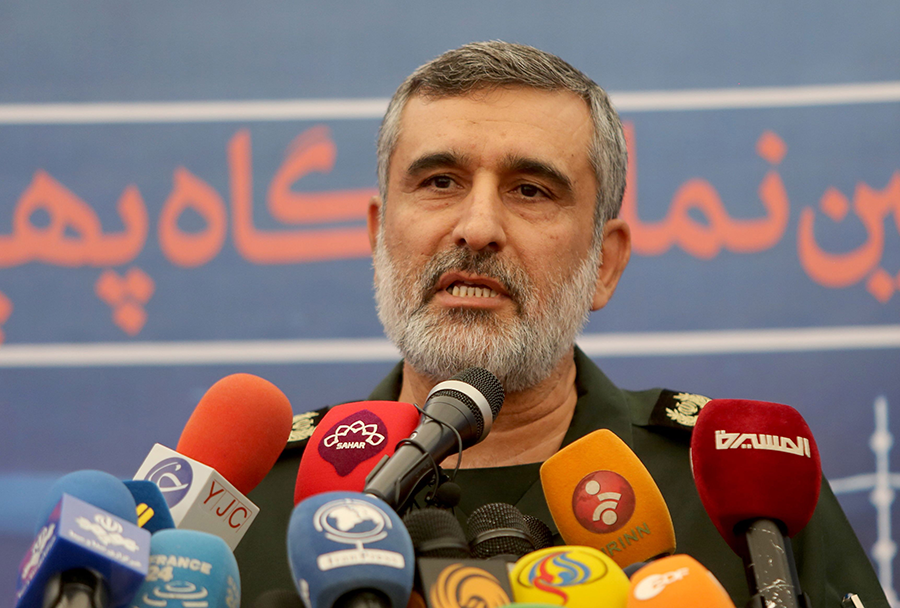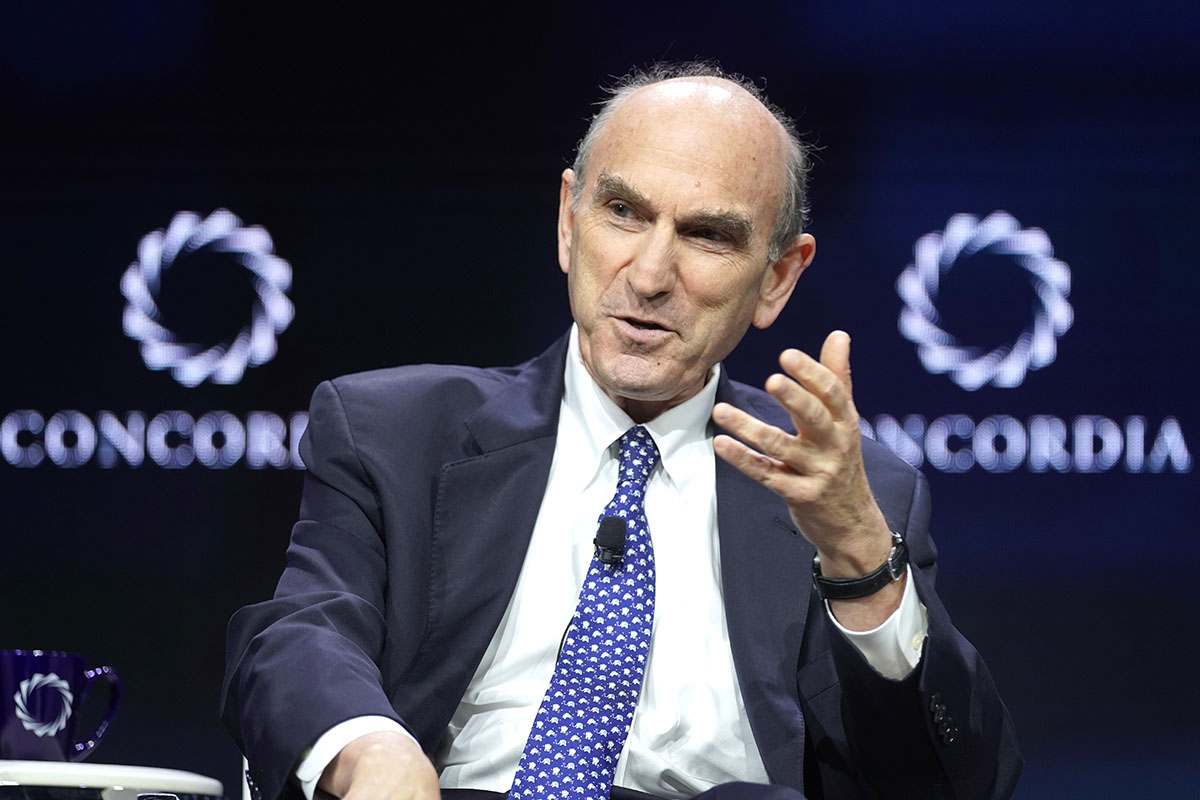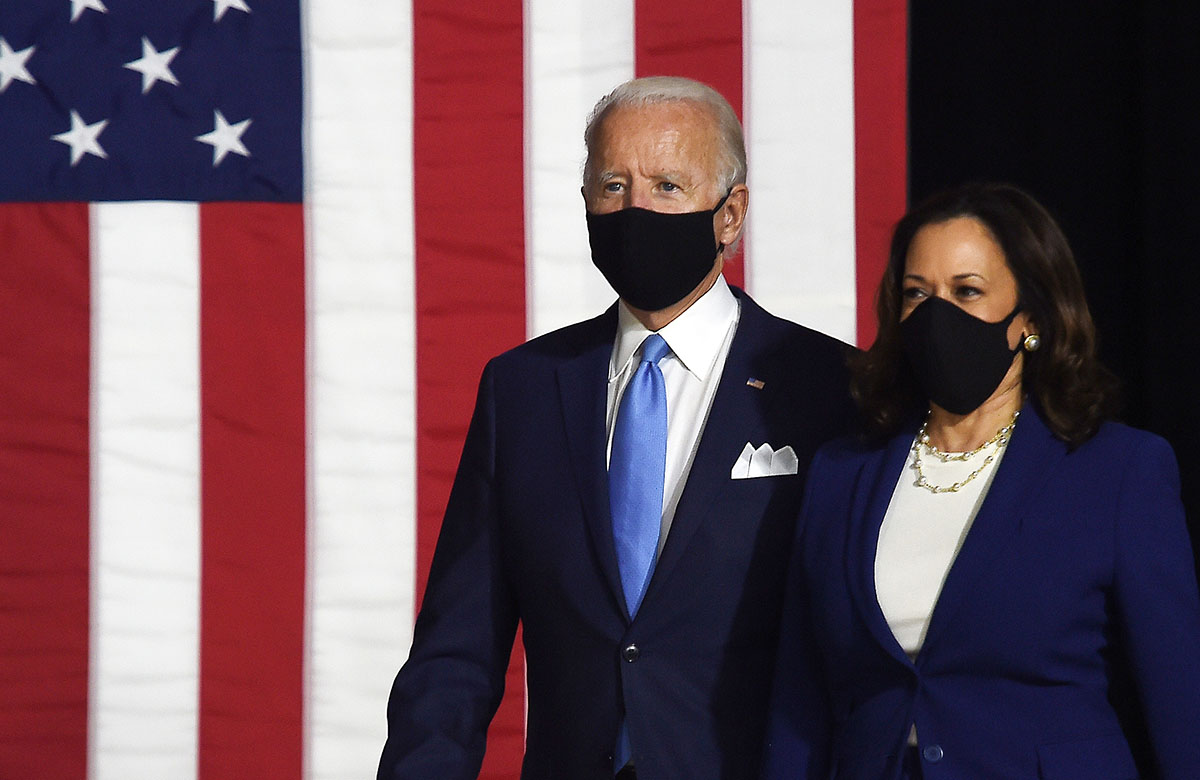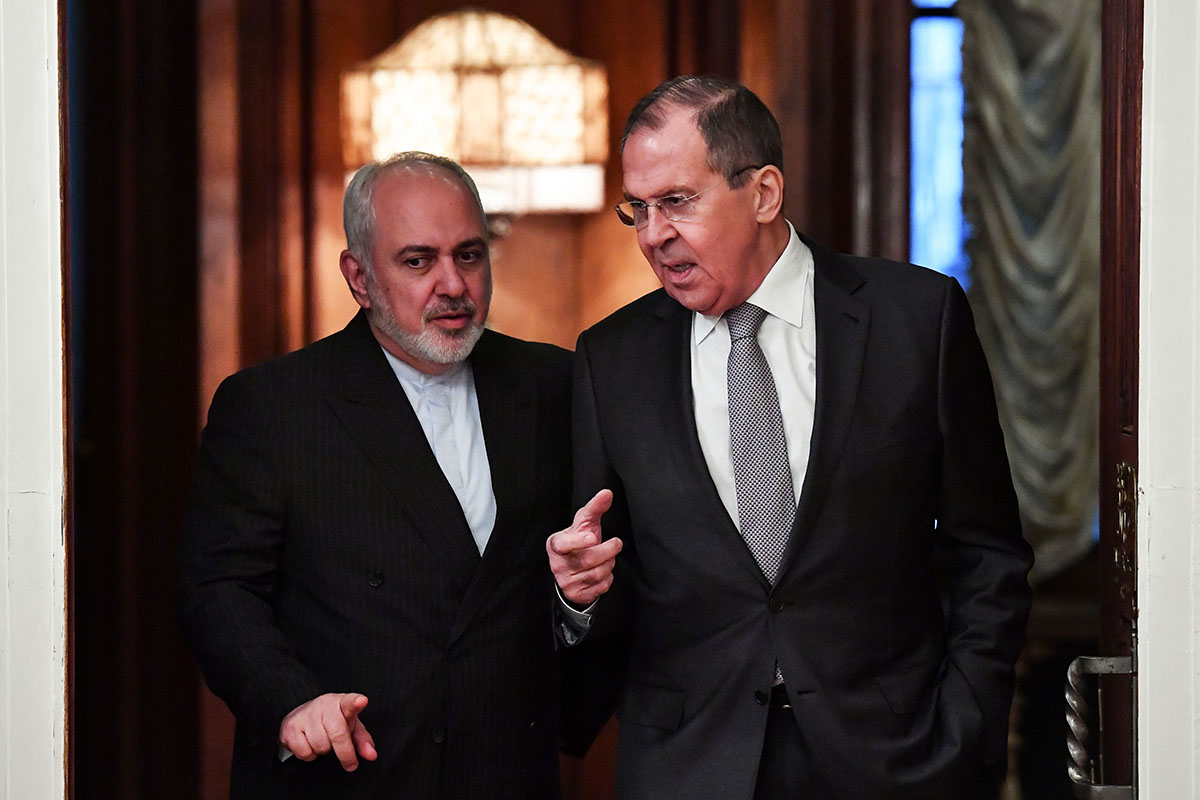Security Council Rejects Iran Arms Embargo Extension
The Security Council decisively rejected a U.S. resolution to extend the UN arms embargo on Iran that is set to expire in October according to the terms of Resolution 2231, which endorses the 2015 nuclear deal and modifies UN sanctions on Iran.
Despite the defeat, U.S. Ambassador to the UN Kelly Craft said Aug. 14 that the Trump administration intends to try and use a mechanism in Resolution 2231 that allows for participants of the nuclear deal to snapback UN sanctions on Iran in order to prevent expiry of the arms embargo. Craft said the United States will “stop at nothing to extend the arms embargo.”
Only the Dominican Republic voted with the United States in favor of the resolution. China and Russia voted against it, while the remaining 11 members of the Security Council abstained. Secretary of State Michael Pompeo said Aug. 14 that “the Security Council’s failure to act decisively in defense of international peace and security is inexcusable.”
Iran’s Ambassador to the UN, Majid Takht Ravanchi, tweeted Aug. 14 that the vote shows the United States is isolated and should learn from this “debacle” that there is no support for snapback. Iran’s Foreign Minister Javad Zarif called the vote a “miserable failure of US diplomatic malpractice.”
The resolution’s defeat was hardly surprising. When the United States first introduced a draft resolution on Iran that included an extension of the arms embargo during a June meeting of the Security Council, states made clear their opposition. The United States then introduced a paired down version of the June draft Aug. 11 that would have extended the embargo “until the Security Council decides otherwise” but removed all of the new sanctions.
It is likely that the Trump administration introduced the new draft to try and garner some support for the measure at the Security Council. The U.S. resolution was never going to pass, given Russian and Chinese veto threats, but the Trump administration may have hoped to come close to a majority to bolster support for its campaign to extend the embargo.
Iran is not a Security Council member, but President Hassan Rouhani lobbied against the resolution. He told French President Emmanuel Macron Aug. 12 that all countries, “especially the P4+1, must strongly oppose” the U.S. resolution. Rouhani has threatened a "crushing" response if the arms embargo is extended.
France, Germany, and the United Kingdom, all members of the Security Council and the 2015 nuclear deal known as the Joint Comprehensive Plan of Action (JCPOA), abstained from the vote. In separate statements, each state raised concern about the negative effects of the embargo’s expiration, but said that the U.S. resolution was unlikely to advance stability in the region and noted the importance of preserving the JCPOA.
The United Kingdom also explicitly said that “we do not support a move to snapback at this time, which would be incompatible with our current efforts to preserve the JCPOA.”
While Craft’s comments signal that the Trump administration intends to follow through with its threat to use the snapback mechanism outlined in Resolution 2231 to reimpose sanctions on Iran, including the arms embargo, it is unclear if the United States will succeed.
When President Donald Trump withdrew from the JCPOA in May 2018, he stated that the United States is no longer a participant in the nuclear deal. Then National Security Advisor John Bolton dismissed the prospect of using snapback to reimpose UN sanctions, “because we’re out of the deal.” Now, the Trump administration is arguing that because the United States is still listed as a JCPOA participant in Resolution 2231, it is entitled to use the snapback mechanism.
In an Aug. 16 oped in The Wall Street Journal, Bolton opposed the Trump administration’s arguments in favor of snapback and called out its cherry-picking of Resolution 2231, saying “[i]t’s too cute by half to say we’re in the nuclear deal for purposes we want but not for those we don’t.” Bolton said “that alone is sufficient reason not to trigger” snapback. He also noted the possible damage to the Security Council if the Trump administration proceeds with snapback.
If the Trump administration is able to initiate snapback, that vote cannot be vetoed, so the United States will not need any support at the Security Council. But reimposing sanctions without any support will certainly divide the UN. It appears likely that a number of states, Russia in particular, will view the reimposition of UN sanctions as illegitimate and will not implement the restrictions, despite being legally obligated to do so as UN member states. This anticipated divide over the legality of the reimposition of sanctions could trigger a crisis of legitimacy that could have implications on future Security Council actions beyond the Iran case.
(For more on the possible ramifications of the U.S. decision to pursue snapback, see The Dangerous Consequences of Trump's Plan to Extend the Arms Embargo.)
Russian President Vladimir Putin proposed Aug. 14 a virtual head-of-state meeting between the P4+1, Iran, and the United States “in order to outline steps that can prevent confrontation” at the UN and to “facilitate the emergence of reliable mechanisms in the Persian Gulf region for enduring security and confidence building.” China said Aug. 15 that it supported the meeting, but Trump said he would “probably not” participate.
Prior to the Security Council vote on the U.S. resolution, Bloomberg revealed that Iran informed the International Atomic Energy Agency (IAEA) of its intention to install three cascades of advanced centrifuges at its underground fuel enrichment facility at the same location.
A July 21 report from the IAEA seen by the Arms Control Association stated that the three cascades in question were being moved from the pilot plant at Natanz. Iran has installed and is operating advanced machines in violation of limits imposed by the JCPOA. Given that these machines were already producing enriched uranium, the move does not appear likely to increase the proliferation risk posed by Iran’s nuclear program.—KELSEY DAVENPORT, director for nonproliferation policy, and JULIA MASTERSON, research assistant
Iran Demonstrates Subterraneous Missile Capability
 Iran’s Islamic Revolutionary Guard Corps (IRGC) demonstrated the country’s newfound capability to launch missiles from underground during a July 29 military exercise. The IRGC’s Aerospace Force Commander, Brigadier General Amir Ali Hajizadeh, announced that day that Iran can now strike anywhere in the Persian Gulf region using its subterraneous missile force. He said that “without utilizing conventional launchpads, the buried missiles suddenly rip out of the earth and hit their targets precisely.”
Iran’s Islamic Revolutionary Guard Corps (IRGC) demonstrated the country’s newfound capability to launch missiles from underground during a July 29 military exercise. The IRGC’s Aerospace Force Commander, Brigadier General Amir Ali Hajizadeh, announced that day that Iran can now strike anywhere in the Persian Gulf region using its subterraneous missile force. He said that “without utilizing conventional launchpads, the buried missiles suddenly rip out of the earth and hit their targets precisely.”
Underground silos are generally more difficult to detect or preempt. This development could increase the survivability of Iran’s missiles, provided that other countries do not know where the missiles are buried.
The firing of Iran’s underground missiles occurred during a large-scale military exercise conducted by the IRGC in the Strait of Hormuz and involving a mock-up of a U.S. aircraft carrier.
That same day, Iran’s Ayatollah Seyyed Ali Khamenei called the U.S. presence in the region “detrimental” and a “cause for insecurity, destruction and backwardness.” While Khamenei’s comments were included in his annual message delivered at the start of the hajj season and were not a direct response to the IRGC drill, they are demonstrative of mounting tensions between Iran and the United States. In late July, Tehran accused two U.S. fighter aircraft of aggressively passing over an Iranian commercial airplane in Syria.
U.S. Secretary of State Michael Pompeo announced the imposition of additional sanctions on Iran July 30, a day after the IRGC drills concluded. These sanctions cover 22 materials that are presumed to be used in connection with Iran’s nuclear, military, or ballistic missile programs.
Elliott Abrams Named Iran Envoy
Elliott Abrams was named the new U.S. special representative for Iran after Brian Hook resigned from the post.
 In an Aug. 6 statement, Secretary of State Michael Pompeo said Hook “achieved historic results countering the Iranian regime” and referenced his role in the release of Michael White and Xiyue Wang from prison in Iran. Pompeo appointed Hook to the role of Special Representative for Iran in 2018. Hook was instrumental in pushing the U.S. maximum pressure campaign on Iran and reiterating Pompeo’s unrealistic demands for a future deal.
In an Aug. 6 statement, Secretary of State Michael Pompeo said Hook “achieved historic results countering the Iranian regime” and referenced his role in the release of Michael White and Xiyue Wang from prison in Iran. Pompeo appointed Hook to the role of Special Representative for Iran in 2018. Hook was instrumental in pushing the U.S. maximum pressure campaign on Iran and reiterating Pompeo’s unrealistic demands for a future deal.
Abrams will assume the Iran portfolio in addition to his role as Special Representative on Venezuela. He has been involved in Iran policy in past administrations. In 1991, Abrams pled guilty to lying to Congress about the Iran-Contra affair. Abrams admitted that he did not disclose information in 1986 about the Reagan administration’s effort to sell arms to Iran and divert funds from the sales to support the U.S.-backed Contra rebels in Nicaragua. Iran, at that time, was subject to an arms embargo.
Seyyed Mousavi, a spokesman for Iran’s Foreign Ministry, tweeted Aug. 7 that there is “no difference” between Hook and Abrams and that when it comes to policy toward Iran, U.S. officials have “bitten off more than they could chew.”
Democratic Party Platform Calls for Return to JCPOA
The draft Democratic Party Platform says a return to compliance with the JCPOA by all parties is “urgent” and part of the effort to “call off the Trump administration’s race to war with Iran.”
 According to a July 21 draft of the platform, the Trump administration’s withdrawal from the JCPOA “isolated us from our allies” and opened a door for Iran to resume nuclear activities limited by the accord. The JCPOA “remains the best means to verifiably cut off all of Iran’s pathways to a nuclear bomb,” the draft states. It also notes that Democrats support diplomatic efforts to address Iran’s nuclear program after JCPOA limits expire, Tehran’s regional aggression, and the country’s ballistic missile program.
According to a July 21 draft of the platform, the Trump administration’s withdrawal from the JCPOA “isolated us from our allies” and opened a door for Iran to resume nuclear activities limited by the accord. The JCPOA “remains the best means to verifiably cut off all of Iran’s pathways to a nuclear bomb,” the draft states. It also notes that Democrats support diplomatic efforts to address Iran’s nuclear program after JCPOA limits expire, Tehran’s regional aggression, and the country’s ballistic missile program.
The Republican National Committee voted in June to adopt its 2016 platform for 2020. In the 2016 document, Republicans said they would not be bound by the JCPOA and said the United States must “retain all options in dealing with a situation that gravely threatens our security, our interests, and the survival of our friends.”
Swiss Channel Processes Transaction
A Swiss pharmaceutical company used a channel set up to facilitate humanitarian trade with Iran for the sale of a cancer treatment drug. This was the first transaction by the Swiss Humanitarian Trade Arrangement (SHTA) since the mechanism was declared fully operational in February.
In a July 27 statement, the Swiss State Secretariat for Economic Affairs said that “further transactions should be carried out shortly” and noted that “a number of countries have already been approved” for the trade channel. Earlier in July, the Swiss Foreign Ministry said that the Covid-19 pandemic led to delays in transactions. While the channel covers food, medicine, and other humanitarian supplies exempt from U.S. sanctions, its creation was necessary to provide banks with assurance that processing the transactions would not incur U.S. penalties.
SHTA differs from INSTEX, which was set up by several European countries to bypass U.S. sanctions and facilitate legitimate trade with Iran. The Trump administration supports SHTA but has threatened to sanction INSTEX transactions.
Iranian President Hassan Rouhani spoke with French President Emmanuel Macron about INSTEX, amongst other issues, in a phone call Aug. 12. INSTEX was established in January 2019, but it has not proved to be an effective instrument for facilitating legitimate trade.
The prior week Rouhani’s chief of staff, Mahmoud Vaezi, said that with the signals Tehran has received from European and Asian countries, “we are in the final days of sanctions.” It was unclear what Vaezi was referring to. Foreign ministry spokesman Abbas Mousavi later clarified Aug. 11 that the “illegal and cruel” unilateral sanctions imposed by the United States would not be lifted.
Russia’s Foreign Minister Sergey Lavrov stressed Moscow’s commitment to preserving the nuclear deal, known as the Joint Comprehensive Plan of Action (JCPOA), during a meeting with his Iranian counterpart July 21. Russia is “sparing no effort” to “get the JCPOA back on sustainable track,” Lavrov said.
 In addition to Iranian foreign minister Javad Zarif, Iran’s ambassador to Russia Kazem Jalali and deputy foreign minister Abbas Araghchi were present at the July 21 meeting.
In addition to Iranian foreign minister Javad Zarif, Iran’s ambassador to Russia Kazem Jalali and deputy foreign minister Abbas Araghchi were present at the July 21 meeting.
Lavrov and Zarif discussed legal avenues to combat the Trump administration’s efforts to reimpose UN sanctions on Iran through a provision of Security Council Resolution 2231, which endorses and helps implement the deal. While the United States unilaterally withdrew from the JCPOA in May 2018, Washington claims to reserve the right to exercise provisions of Resolution 2231 to snapback sanctions on Iran because the text of the resolution was never amended to reflect U.S. withdrawal.
Iran has threatened to take action in response to any attempt snapback sanctions, including withdrawing from the JCPOA.
The U.S. push to snapback sanctions may also create a division within the Security Council. If the United States succeeds in reimposing those measures, all UN member states would be legally obligated to implement them, but both Iran and Russia have made apparent their refusal to accept a re-imposition of sanctions on Iran by the United States under Resolution 2231.
In a tweet following the meeting, Zarif noted that he and Lavrov share “identical views” on the JCPOA and on the need to uphold international law.
The foreign ministers also discussed the International Atomic Energy Agency’s (IAEA) ongoing investigation into past possible undeclared nuclear activities in Iran. Russia voted against a resolution passed by the IAEA Board of Governors in June calling on Iran to cooperate with the IAEA’s investigation into past activities.
During the meeting, Zarif noted that Tehran is “pleased that Russia has confronted the US unilateral policies at the UN Security Council and the International Atomic Energy Agency,” and is thankful the two countries “work closely together on this issue.”
In Case You Missed It...
- Jason Rezaian, “A requiem for Trump’s failed Iran envoy,” The Washington Post, August 12
- Ariane Tabatabai and Or Rabinowitz, “Trump Misses Being Part of the Iran Deal,” Foreign Policy, August 12
- Saheb Sadeghi, “It doesn’t matter who wins in November, Iran will not renegotiate the JCPOA,” Atlantic Council IranSource, August 11
- Hikmet Çetin, “Sanctions on Iran put the health of US allies at risk,” European Leadership Network, July 31
- Dalia Dassa Kaye and Shira Efron, “Israel’s Evolving Iran Policy,” IISS Blog, July 23
